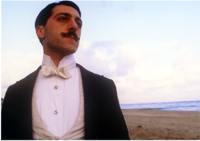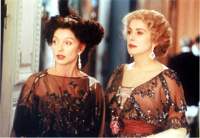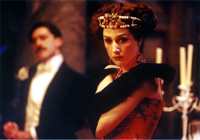
Le Temps Retrouvé
©Blu Cinematografica, Blu Film,
Centre National de la Cinematografie,
France 2 Cinéma, Gémini Films, Le Studio Canal+,
Les Films du Lendemain, Madragoa Films
Distribution: Het Nederlands Filmmuseum, Holland

|
Literature and cinema sometimes seem to be at odds with one another. There are
always members of a select society who are readily prepared to toss their remarks as
well as their personalities across the room at elite cocktail parties and can often be
heard saying, "The film was good, but nowhere near as good as the book."
Occasionally, this might be true and could either be the result of incompetent
transference from one medium to the other or sloppy and lackadaisical craftsmanship
on the part of the writers and filmmakers. Proust, however, is another cup of tea
altogether. The same intelligentsia who are willing to condemn past attempts to put
the Frenchman's life's work onto the screen will, once scrutinized, most likely be
discovered to never have read "A la recherce a temps perdu" from beginning to end.
No wonder, coming in at around 7,000 pages (fifteen parts) and not completely being
finished to the author's satisfaction before his own life was. Even the previous
attempt to capture part of this elusive structure on film, "Un Amour du Swann" (taken
from "Du coté de chez Swann"), had a period of turmoil. Pinter's screenplay was
discarded by Losey several years before a screenplay by Peter Brook, Jean Claude
Carriere, Volker Schlöndorff, and Marie-Hélène Estienne was accepted to become
the long awaited realization of this piece as directed by Volker Schlöndorff. The
result was visually enticing, but the full effect never managed to capture the right
atmosphere of the original first part as penned by the master. Then, of course, there
is the case of Visconti whose endeavor proved fruitless. The most recent cinematic
attempt has been to capture the last piece of the work ("Le Temps Retrouvé") on
screen and it has unquestionably succeeded more strongly and more sublimely
where others have failed. Excuse me for one short second while I refill my glass of
absinthe.
Le Temps Retrouvé
©Blu Cinematografica, Blu Film,
Centre National de la Cinematografie,
France 2 Cinéma, Gémini Films, Le Studio Canal+,
Les Films du Lendemain, Madragoa Films
Distribution: Het Nederlands Filmmuseum, Holland

|
Where was I? Oh yes. Who would have expected a Chilean leftist experimental
filmer to have done so well with decadent France around the time of World War I?
Raoul Ruiz has managed to capture an essence which may not be exactly what
Proust had in mind, but remains eminently acceptable as a cinematic counterpart (or
should I say counterpoint?) Besides, Marcel would have been immensely flattered by
watching himself mingle between the frames surrounded by luminescent stars
(Catherine Deneuve, John Malkovich, Emmanuelle Béart, Alain Robbe-Grillet, Ingrid
Caven and even Marie-France Pisier are all in présence). Wherever did they find his
double? Not only is the face right, but the eyes are absolute perfection. Excuse me,
do you know where they keep those strawberries dipped in ether?
As Proust (Andre Engel), assisted by the voice-over of Patrice Chereau, dictates
passages from his sick bed to housekeeper Céleste (Mathilde Seigner), he mixes
fictions and fantasies with the fascinating realities of life while reflecting over endless
photographs. Childhood in Combray, vacations on the coast of Normandy, and
evenings in the literary salons of Paris all find their special place in the memories of a
dying man. The actor moving about through the memories of the elder Proust is the
younger version portrayed by Marcello Mazzarella (also assisted by the voice over of
Patrice Chereau). From beginning to end, he watches himself surrounded by the
pieces of his puzzled life as the real Proust did in his greatest work.
Note: (During his lifetime, several acquaintances and associates, André Gide included, considered
Marcel Proust as nothing more than a constant partygoer and somewhat glorified gossip columnist
until they became aware of his unexpected and revered masterpiece.)
Le Temps Retrouvé
©Blu Cinematografica, Blu Film,
Centre National de la Cinematografie,
France 2 Cinéma, Gémini Films, Le Studio Canal+,
Les Films du Lendemain, Madragoa Films
Distribution: Het Nederlands Filmmuseum, Holland

|
Ruiz has transposed the fragmented character of the original work into an enticingly
visual entourage of characters and situations. It moves around as a moment in
memory or a dream, always joining up with another thought for the next movement,
and in this way recreates, in its personal way, the world of marvelous Marcel. The
camera of DP Ricardo Aronovich glides easily between the endless spaces and
these spaces move like a fantasy before his opulent lens. The corridors between the
past and the present move fluidly and invite one into the ever-changing events and
images.
A brave attempt and a successful one. Taking on Proust's towering work is a difficult
task at least and this realization is well worth the viewing. The uninitiated will
become the inundated. Be prepared for a long (enjoyable) sit and be aware that the
book is still available in print for those who become curious or (even possibly)
obsessed. The written page of this classic remains irrefutably one of the special
experiences of literature. That is possibly why it is so difficult to adapt it to the
screen.
"The real voyage of discovery consists not in seeking new landscapes, but in having
new eyes."
I think I've had enough to satisfy my thirst. Madeleine, anyone?
© 1994-2006 The Green Hartnett
|

